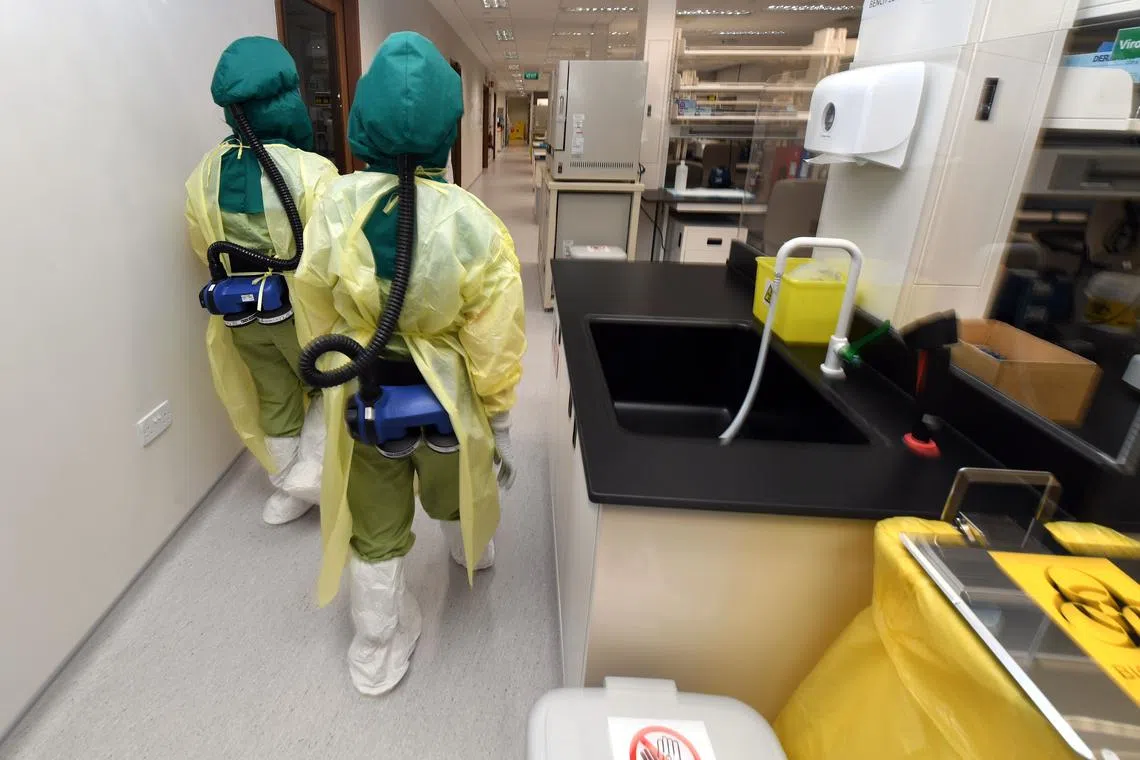New agency to boost tackling of infectious diseases to be set up by first half of 2025
Sign up now: Get ST's newsletters delivered to your inbox

The establishment of the new agency is a response to the three recommendations presented in the Covid-19 White Paper.
PHOTO: ST FILE
Follow topic:
SINGAPORE - A new lead agency to prevent, prepare for, detect and manage infectious diseases will be set up by the first half of 2025, with the passing of a new Bill on Jan 7.
The move is to allow for better integration and organisation of public health functions for communicable diseases, and to improve overall command, control and coordination of public health responses.
The plan to establish the Communicable Diseases Agency (CDA) was unveiled by Health Minister Ong Ye Kung during the parliamentary debate on the Covid-19 White Paper in March 2023.
Singapore’s current capabilities in managing communicable diseases reside in several entities, said Minister of State for Health Rahayu Mahzam on Jan 7 during the second reading of the Bill, which sets out the legislative framework for the new agency.
For example, while the Ministry of Health (MOH) sets policy, the National Centre for Infectious Diseases administers the public health control measures as part of national programmes, and the Health Promotion Board does public education.
“By consolidating (these areas) into a dedicated agency, it will help us systematically build up strong public health expertise and organisational capacity and establish international linkages, to better tackle future pandemics,” said Ms Rahayu.
The establishment of the new agency is a response to the three recommendations presented in the Covid-19 White Paper.
First, Singapore must not lose the capabilities it had deepened and developed during the Covid-19 response,
Second, Singapore should institutionalise the use of science and technology in responding to infectious disease threats.
Lastly, the country needs to strengthen the structures and capabilities for forward planning and preparedness to respond to the next pandemic in a more agile and fluid manner.
CDA has five areas of responsibility – to prevent, prepare for, detect and respond to infectious diseases, as well as to enable research, said Ms Rahayu.
Prevention: This can be achieved through a combination of public education with robust vaccination policy and implementation, building and promoting infection prevention and control capabilities and practices across different settings, and combating the threat of antimicrobial resistance.
Preparation: CDA will lead and coordinate public health preparedness and readiness efforts. Ms Rahayu said Singapore’s Covid-19 experience has reinforced the need to invest in these measures. Such groundwork must be laid during “peacetime”. Covid-19 has demonstrated that pandemics can last much longer than previously anticipated, causing massive societal and economic disruption far beyond the health sector.
“(The agency) will work with stakeholders from various sectors and agencies to build sectoral readiness against infectious disease crises, and to safeguard national interests such as vaccine and therapeutics development and access. CDA will also work with MOH and healthcare institutions to build capabilities and capacity in key areas such as laboratory testing and clinical management,” she added.
Detection: Surveillance is key to detecting infectious diseases. Continuously monitoring the system locally and internationally will allow Singapore to identify and make sense of unusual developments.
“CDA will strengthen our surveillance capabilities, including exploring the use of new modalities of surveillance such as through genomic testing and wastewater testing to supplement traditional surveillance approaches,” Ms Rahayu said.
It will also “explore data analytics and artificial intelligence to enhance our ability to make sense of large volumes of data”, she added.
Response: The new agency will respond to and investigate cases and outbreaks of infectious diseases in Singapore. This will take place routinely for endemic diseases, as well as during a potential crisis.
During a pandemic, while the approach and strategy will be driven by MOH, or the equivalent of a multi-ministry task force during Covid-19, CDA will provide policy and scientific recommendations.
It will also work with MOH and other agencies to carry out the operations. These will include a combination of public health and social measures that include case investigation, contact tracing, masking, physical distancing, and border control measures.
Research: CDA will also look after research, which is an important aspect of preparation to ensure a scientifically robust and data-driven response to infectious diseases.
“CDA will coordinate and conduct public health research. It will make use of the findings from local and international studies and translate research findings into public health and clinical actions and policies,” Ms Rahayu said.
She also pointed out that given that the next pandemic is likely to come from abroad, CDA will also engage Singapore’s counterparts overseas.
“This will allow us to detect international emerging situations of concern earlier, and buy us invaluable time to prepare for and implement mitigating measures,” she added.
Dr Wan Rizal (Jalan Besar GRC) and Mr Yip Hon Weng (Yio Chu Kang) asked how CDA will work with other agencies to tackle endemic diseases like dengue and influenza.
Ms Rahayu said CDA will work with agencies as part of an ongoing multi-sectoral and integrated approach to combat emerging public health threats.
“Today, we work closely with NEA (National Environment Agency) to mitigate the impact of vector-borne diseases like dengue fever, with SFA (Singapore Food Agency) on food safety, and with NParks (National Parks Board) on diseases that may affect both animals and humans,” she added.


